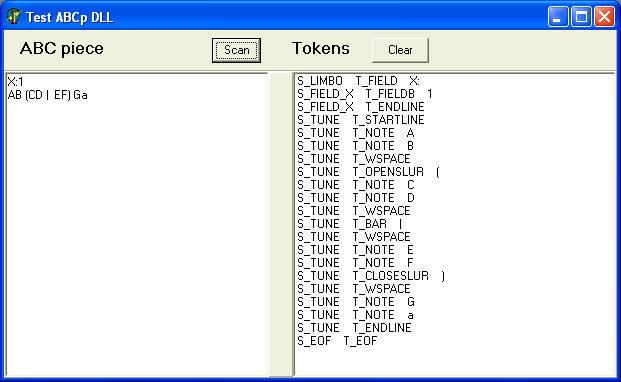| the ABC Parser |
| last update: 09 Dec 2004 |
:: Home :: News :: Docs :: Download :: Links :: Contacts |
|
Hosted on Remo Dentato '04 |
Using ABCp from Delphi
|
unit abcp; interface function abcScanFile(filename: PChar; handler : pointer) : integer; cdecl; external 'abcp.dll' name '_abcScanFile'; function abcScanString(buffer: PChar; handler : pointer) : integer; cdecl; external 'abcp.dll' name '_abcScanString'; function abcToken(s: Pointer): integer; cdecl; external 'abcp.dll' name '_abcToken'; function abcTokenName(n: integer) : Pchar; cdecl; external 'abcp.dll' name '_abcTokenName'; function abcState(s: Pointer): integer; cdecl; external 'abcp.dll' name '_abcState'; function abcStateName(s: integer): Pchar; cdecl; external 'abcp.dll' name '_abcStateName'; function abcString(s: Pointer): PChar; cdecl; external 'abcp.dll' name '_abcString'; function abcFilename(s: Pointer): PChar; cdecl; external 'abcp.dll' name '_abcFilename'; function abcLine(s: Pointer): integer; cdecl; external 'abcp.dll' name '_abcLine'; function abcColumn(s: Pointer): integer; cdecl; external 'abcp.dll' name '_abcColumn'; implementation end. |
To increase readibility, the interface functions are in bold.
Note that the two enum's (Tokens and States) have been represented as integers in Pascal, they could well be represented as enumerated type.
If you have a look at "abcp.h"
you can see how easy has been to create the above unit.
3. Test application
In the download section you will find a test application with all the source (Delphi 6), and the abcp.dll.
I do apologize for the poor interface design, and uselessness of the example, please consider it's only a proof of concept!!!
3.1 The user interface
The test application user interface is a single window split in two sections:

On the left you can write a piece of music in ABC and
on the right (once Scan has been pressed) you will see the tokens
returned by the abcScanString() function.
3.2 The code
Again, the "handler interface" has been used for this example. This is the only interface defined so far, is very low level but it gives you the ability of interpreting ABC files (more or less) easily.
There are only two relevant functions in the code. The function that starts the scanning:
procedure Tfrm_abc.btn_scanClick(Sender: TObject); var r: integer; begin r := abcScanString(PChar(txt_abc.Text),@handler) end; |
and the handler that gets called at each token.
function handler(h:pointer):integer; cdecl;
var i:integer;
begin
i:=frm_abc.lst_toks.Items.Add( abcStateName(abcState(h)) + ' ' +
abcTokenName(abcToken(h)) + ' ' +
abcString(h));
handler:=0;
end; |
The handler is a "normal" pascal function, only
cdecl has been added to ensure that
the parameters are passed correctly.
4. Conclusion
It seems that using ABCp from another language is not too difficult.
It's fair to say that for each language, an interface needs to be built (like our abcp.pas unit) that encapsulate the ABCp API. How complex is to create it will depend on the language at hand.
Next steps for expanding the proof of concept in this direction is to target Kylix on Linux (for his similarity with Delphi), VB and Java.